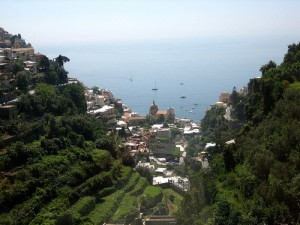The Liberation of Use-Them-Or-Lose-Them Frequent Flyer Miles
This year, Daniel Kahneman has me wondering about what is the best way to organize my vacation time. In this great TED talk – The Riddle of Experience versus Memory, he talks about the tradeoffs we must make in increasing our moment-to-moment experience of happiness versus increasing our memories of happiness.
If you want to maximize your memories of happiness, you should spend more time taking pictures of your vacation and jam more events into each day. If you want to maximize your moment-to-moment experience of happiness, you spend less time recording your experience and more time experiencing them directly.
Earlier this summer, I traveled to the UP, the Upper Peninsula of Michigan, vacationing as I do every year with my family. When I’m in the UP, my daily activities are biased toward experiential happiness (which at least for me is enhanced by lingering repetition of the familiar –lake swims, family sing-along to Rise Up Singing, and trips to the dunes at Grand Marais for the umpteenth time).
But a few weeks ago, I went on a very different “more is more” vacation. Early in August, I received a robo call out of the blue from United Airlines warning me that a substantial number of my frequent flyer miles were going to expire if I didn’t use them.
I sprang into action, and found myself splurging on things I never would have been willing to pay for. My spouse and I stayed for the first time at the Plaza in New York, and were scheduled to stay at the Waldorf Astoria the night Irene hit the fair metropolis.
 Photo: Boobooo
Photo: BooboooBut I consumed most of our miles on a spur of the moment bike trip to the Amalfi coast with my 14-year old daughter, Anna. With the heroic assistance of Jerry de Concilio at That’s Amore Bike Rental & Cycling Holidays, we rented a tandem bike and explored the Sorrentine Peninsula. Unlike my sojourns in the UP, this vacation was organized much more to maximize memories of happiness. In what turned out to be our big biking day, Anna and I peddled from Naples to Pompei. The next day Jerry personally led us on a “Path of the Gods” hike that included some of most beautiful coastal views I’ve ever seen, but also wore me out. Anna and I weren’t maximizing moment-to-moment joy. But already I have very dear memories of the trip (which included daddy school study of pre-calculus, along with some successful dress shopping).
If it weren’t for my expiring miles, I would never have experienced any of it. Suddenly I think there might be a new kind of value in wasting assets. The wasting and dedicated-use qualities can serve as commitments to splurge on kinds of consumption that you’d like to do but feel constrained not to.
Striking the Right Balance
Stepping back, the Kahneman dichotomy between experiential and memory happiness has a lot more to say to us than how much time on vacation you should devote to taking pictures (to enhance later memories). The tradeoff between these two broad categories is also at play in David Brooks‘s insight about what we admire most in others:
The graduates are also told to pursue happiness and joy. But, of course, when you read a biography of someone you admire, it’s rarely the things that made them happy that compel your admiration. It’s the things they did to court unhappiness — the things they did that were arduous and miserable, which sometimes cost them friends and aroused hatred. It’s excellence, not happiness, that we admire most.
The things we do that are “arduous and miserable” are what make us most proud of ourselves.
Kahneman’s modest goal in his talk is to recommend that we make more conscious choices about what mixtures of happiness we want to pursue. Through his lens, we can see that Tiger parents pursue a kind of happiness for themselves and their children that is skewed highly away from moment-to-moment joy. De Gustibus. But I personally find that a life wholly lacking in the pursuit of either form of happiness is less worth living.

Comments